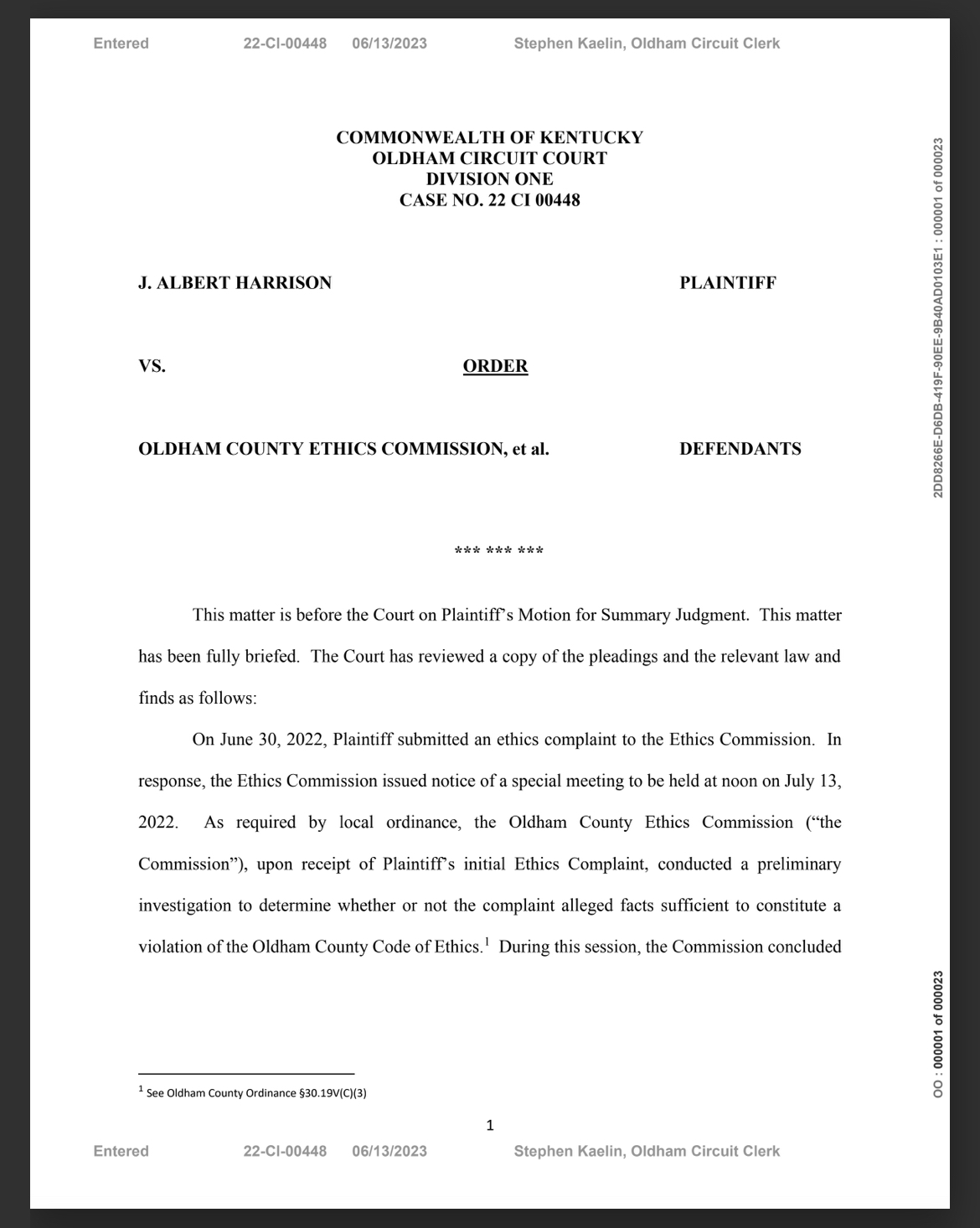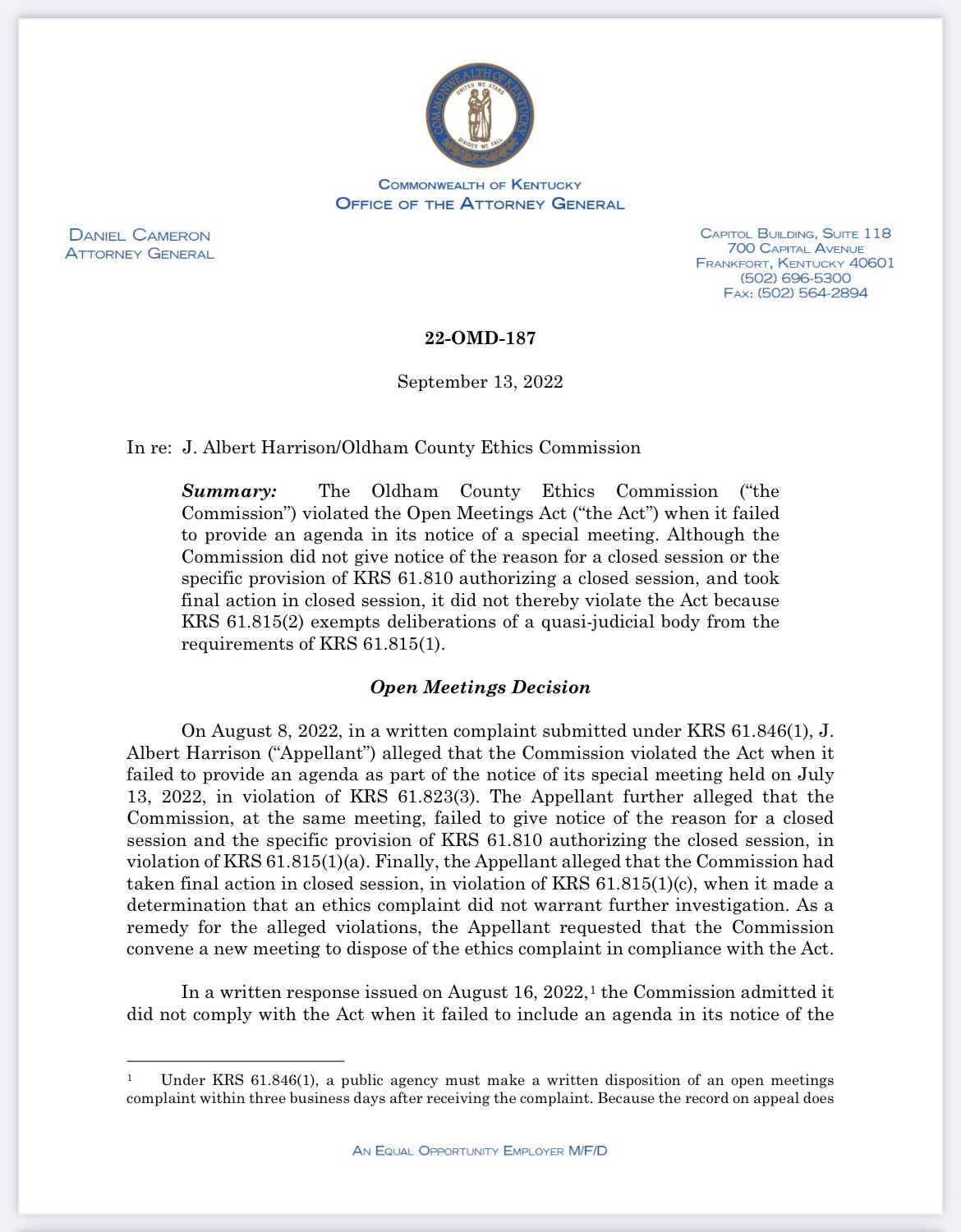

The Oldham County Circuit Court handed Attorney General Daniel Cameron a major defeat on June 13, reversing Cameron’s open meetings decision, 22-OMD-187, and ruling that the Oldham County Ethics Commission violated the open meetings law when it conducted a closed session that did not conform to statutory requirements designed to "maximize notice of public meetings and actions."
The circuit court’s opinion is the most recent example of Cameron's penchant for ignoring precedent if it conflicts with his policy preferences.
https://drive.google.com/file/d/1kHzUyuhEjoAerC5EY6FCpcxcVb_ic9ub/view?…;
https://caselaw.findlaw.com/court/ky-supreme-court/1012466.html
In J. Albert Harrison v. Oldham County Ethics Commission, Judge Jerry Crosby II reversed a September 2022 Cameron decision in which the the Attorney General determined that although the Ethics Commission failed to comply with statutory requirements for conducting a closed session, the Commission's noncompliance did not violate the Open Meetings Act.
https://www.ag.ky.gov/Resources/orom/2022/22-OMD-187.pdf
https://apps.legislature.ky.gov/law/statutes/statute.aspx?id=23045
While the court’s insistence that “an administrative agency [like the Attorney General acting under authority of KRS 61.880(2)] either must conform with its own precedents or explain its departure from them” is the most significant takeaway in the Harrison opinion, the court reaffirms longstanding interpretation of a confounding statute — KRS 61.815(1) and (2).
That statute provides:
“(1) Except as provided in subsection (2) of this section, the following requirements shall be met as a condition for conducting closed sessions authorized by KRS 61.810:
(a) Notice shall be given in regular open meeting of the general nature of the business to be discussed in closed session, the reason for the closed session, and the specific provision of KRS 61.810 authorizing the closed session;
(b) Closed sessions may be held only after a motion is made and carried by a majority vote in open, public session;
(c) No final action may be taken at a closed session; and
(d) No matters may be discussed at a closed session other than those publicly announced prior to convening the closed session.
(2) Public agencies and activities of public agencies identified in paragraphs (a), (c), (d), (e), (f), but only so far as (f) relates to students, (g), (h), (i), (j), (k), (l), and (m) of subsection (1) of KRS 61.810 shall be excluded from the requirements of subsection (1) of this section.”
https://apps.legislature.ky.gov/law/statutes/statute.aspx?id=23045
What follows is an analysis of the Attorney General’s strained interpretation of KRS 61.815(1) and (2) and why the court rejected it.
The Attorney General had determined that the Commission was excused by the second part of the statute from the requirements of the first part of the statute which mandates that the agency publicly identify the legal basis for a closed session and take no final action in closed session.
Cameron reasoned that because the Commission could legally go into closed session to discuss the ethics complaint under the open meetings exception for "deliberations of judicial or quasi-judicial bodies regarding individual adjudications," the Commission "did not have to comply with the requirements regarding notice of a closed session."
https://apps.legislature.ky.gov/law/statutes/statute.aspx?id=52570
(see subsection (1)(j)).
In reversing the Attorney General's open meetings decision, and voiding the action illegally taken by the Commission in closed session, Judge Crosby focused on the Attorney General’s unexplained departure from an interpretation of KRS 61.815(1) and (2) that “goes back forty plus years with no overt repudiation by the Courts or the legislature as to a different interpretation."
Cameron’s interpretation of the statute, Judge Crosby agreed, “would eviscerate most of the Open Meetings Act’s operative provisions.”
The judge quoted, at length, a 2005 open meetings decision, In re: The Courier-Journal/Louisville Arena Task Force, 05-OMD-148, in which then-Attorney General Greg Stumbo observed:
"These provisions have existed in the law since its enactment, and since its enactment the Attorney General has wrestled with an interpretation of KRS 61.815(2) that does not entirely defeat the purpose and intent of KRS 61.815(1).
"In OAG 80-248, we analyzed the language of KRS 61.815 in an attempt to resolve the 'problem of statutory interpretation' it presents. There, we observed:
"'Taken literally KRS 61.815(2) excludes from any formality concerning going into a closed session every exception listed in KRS 61.810 except (b), (e), and (f) as it relates to students -- acquisition or sale of real property, collective bargaining negotiations and personnel matters. Such a literal interpretation would mean that an agency could go into closed session without any of the formalities set forth in KRS 61.815 under the other exceptions listed. However, we do not believe that the literal interpretation comports with the legislative intent. We believe that the legislative intent is that agencies, per se, which are exempt from complying with the Open Meetings Law, such as the Parole Board, juries, the Governor’s cabinet, committees of the General Assembly and other agencies exempted by statute or by the Constitution do not have to go through the formalities set forth in KRS 61.815, and that agencies which are not exempt per se but which go in closed session to deal with an excepted subject matter must observe those formalities.'
"Chief among the Attorney General’s reasons for reaching this conclusion was practicality. We observed:
"'When a public agency which is generally required to hold open meetings finds it necessary to go into a closed session to deal with a particular excepted subject matter, the spirit of the Open Meetings Law and the concern of the public is best served by observing the steps set forth in KRS 61.815. For such an agency, convened in a regular or special meeting in accordance with KRS 61.820-61.825, to go into closed session without first giving notice in open session of the general nature of the business to be discussed and without first passing a motion in open session, would create doubt in the minds of members of the public as to whether the Open Meetings Law was being properly observed and could, in fact, lead to laxity in observing the law.' OAG 80-248, p. 2; accord, 94-OMD-78; 97-OMD-96; 01-OMD-181. So, too,
would an agency’s practice of taking final action in a closed session in
contravention of KRS 61.815(1)(c).
"While we acknowledge that KRS 61.815(2) lends itself to conflicting interpretations, we are not prepared to depart from twenty-five years of interpretation of the law absent judicial repudiation of our position. The Louisville Arena Task Force is not exempt, per se, from complying with the Open Meeting Act, and we therefore conclude that it cannot take final action in a closed session."
Judge Crosby noted that Harrison's attorneys -- open government experts Jeremy Rogers and Suzanne Marino of Louisville's Dinsmore & Shohl, cited decades of caselaw mirroring these decisions as well as:
"numerous Attorney General opinions interpreting KRS 61.815(2), and the Court reviewed every single one. Up until 2018, the Attorney General consistently held that the exemption contained in KRS 61.815(2) applied only to those agencies, per se, which were exempt from complying with the Open Meetings Law, such as Parole Board, juries, Governor’s cabinet, committees of the General Assembly and other agencies exempted by statute or by the Constitution. However, with no reference to or discussion of prior Attorney General opinions, the Attorney General in this opinion, basically eradicated forty plus years of precedent regarding the interpretation of this provision, citing to a Kentucky Supreme Court case of Cunningham v. Whalen."
https://caselaw.findlaw.com/court/ky-supreme-court/1610403.html
The court easily distinguished the Cunningham opinion:
"The Supreme Court’s decision does not suggest that anyone argued the city violated KRS 61.815(1); in fact, KRS 61.815(1) is not mentioned at all in the opinion. The singular mention of KRS 61.815(2) in the opinion was in the cited footnote. [Harrison] argues there was nothing in the Cunningham footnote or elsewhere in the opinion to suggest that the Supreme Court intended to depart from decades of precedent regarding the interpretation and application of KRS 61.815(2)."
All of this is critical to rights long vested in the public under of Kentucky's open meetings law.
But in a larger sense, it highlights a shared concern that Cameron’s 2022 open meetings decision “overturns decades of decisions by both the Attorney General and the Kentucky Courts. What is most troubling is this opinion offers no rationale for this departure especially in light of the fact that no changes were made by the legislature to these provisions of the Open Meetings Act."
This is the crux of the court's opinion in Harrison v. Oldham County. For more on this issue, see https://kyopengov.org/blog/why-oldham-circuit-court-reversal-daniel-cam…


